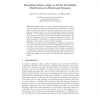140
click to vote
ECAI
2010
Springer
14 years 11 months ago
2010
Springer
Abstract. Statistical relational models, such as Markov logic networks, seek to compactly describe properties of relational domains by representing general principles about objects...
153
click to vote
ACL
2010
15 years 4 days ago
2010
Open-ended spoken interactions are typically characterised by both structural complexity and high levels of uncertainty, making dialogue management in such settings a particularly...
115
click to vote
AAAI
2006
15 years 3 months ago
2006
Intelligent agents must be able to handle the complexity and uncertainty of the real world. Logical AI has focused mainly on the former, and statistical AI on the latter. Markov l...
119
click to vote
IJCAI
2007
15 years 3 months ago
2007
A formula in first-order logic can be viewed as a tree, with a logical connective at each node, and a knowledge base can be viewed as a tree whose root is a conjunction. Markov l...
111
click to vote
ICDM
2006
IEEE
15 years 8 months ago
2006
IEEE
Entity resolution is the problem of determining which records in a database refer to the same entities, and is a crucial and expensive step in the data mining process. Interest in...
139
click to vote
KI
2007
Springer
15 years 8 months ago
2007
Springer
Abstract. Markov logic, as a highly expressive representation formalism that essentially combines the semantics of probabilistic graphical models with the full power of first-orde...
116
click to vote
WWW
2009
ACM
15 years 9 months ago
2009
ACM
Most of the approaches for dealing with uncertainty in the Semantic Web rely on the principle that this uncertainty is already asserted. In this paper, we propose a new approach t...

